In an era marked by disruption, inequality, and accelerating global change, universities are increasingly being called upon to reimagine their roles, not only as centers of knowledge but as agents of societal transformation. This international event provides a unique space for reflection, collaboration, and critical dialogue on the evolving responsibilities of higher education institutions.
This two-day forum brings together university leaders, scholars, and practitioners from across Europe and Asia to present their research and experiences under the umbrella of the Magna Charta Observatory's global initiative on The Responsive and Responsible University.
Diverse institutional approaches and case studies
How universities respond to contemporary societal needs
Higher education's role in equity, sustainability, and civic engagement
The research project aims to present the theoretical concept of the Responsive and Responsible University and illustrate it with the case of Mykolas Romeris University's (MRU, Lithuania) support to the war affected Ukrainian people. From the very beginning of the conflict, the University activated its strategic documents, devotion to the Magna Charta Universitatum values, and humanistic traditions. The conflict inspired the practical application of the University's Third Mission—community engagement and contribution to society. A review of the concept of the Responsive and Responsible University was carried out and four pillars were identified including Stakeholder Engagement; Corporate Social Responsibility and the Third Mission; Co-Creation Strategies; Shared Leadership. The case study of MRU's support to the Ukrainian people was examined from several perspectives: immediate humanitarian assistance, academic inclusion and support, infrastructure provision, advocacy and solidarity with Ukrainian universities, community engagement, activation of national and international networks, and long-term strategic planning and impact. The research project also considers the larger implications for future university policy and practice.

Mykolas Romeris University, Lithuania
Will be updated soon

Mykolas Romeris University, Lithuania
Will be updated soon
Community Engaged Research and/or Learning (CER/L) offers universities a dynamic mechanism to proactively engage with societal partners to address challenges and deliver long-term, impactful collaboration, for mutual benefit. This case study explores how Technological University Dublin (TU Dublin) has embedded CER/L through its long-standing Students Learning with Communities (SLWC) programme, drawing on over sixteen years of experience. It examines how CER/L has evolved and continues to develop in this newly established university, formed through the merger of three institutions with origins dating back to the late nineteenth century. Guided by a theoretical framework grounded in civic engagement, organisational change, and trust-building, this study critically evaluates the structures, leadership, and practices that support—or hinder—responsiveness to community ideas and needs. The study concludes with pointers and guidance on sustaining best practices and developing enhanced supports to expand CER/L as a vital community engagement activity. Key findings emphasise the importance of institutional values and commitment, cross-functional and cross-sectoral collaboration, relationship-building, and embedded support systems to ensure the long-term sustainability of CER/L.

Technological University Dublin, Ireland
Dr Catherine Bates is Research Engagement Lead in TU Dublin, supporting researchers and societal partners to collaborate on projects for societal impact, to address Sustainable Development Goals. Previously Catherine managed TU Dublin's Programme for Students Learning With Communities from 2008-23, supporting and embedding community engaged research and learning in the university curriculum. Catherine coordinated TU Dublin's involvement in three EU-funded projects supporting community engagement in research: CIRCLET (2019-22), EnRRICH (2015-2018) and PERARES (2010-2014). She also managed the university's Access and Civic Engagement Office for a year. Catherine previously lectured in design for 10 years, worked as an adult education coordinator in a community addiction service, and completed her PhD in sociology. Catherine has published and presented internationally on community engaged research and learning.

Technological University Dublin, Ireland
Dr. Mary Deasy is Head of Research & Innovation for Impact and Engagement at Technological University Dublin. She manages the Research Engagement and Impact Office, supporting researchers to put engagement at the core of their practice, and to maximise societal and policy impact. Her expertise includes science communication, public engagement, and research impact assessment. She established TU Dublin's Research & Innovation website, social media presence, and annual recognition awards programme. In 2024, she led the development of TU Dublin's CoARA Action Plan. She is committed to interdisciplinary research aligned with TU Dublin's Strategic Intent 2030. Previously, she managed the Centre for Applied Science for Health and an analytical services group for industry on the Tallaght campus. An active principal investigator, her research includes environmental and medical sensor technologies. She joined TU Dublin in 1993 as an academic, after working in research and development with Syntex in Ireland and California. Dr. Deasy holds a BSc and PhD in Chemistry from University College Cork and has led several major institutional reviews and accreditations.
This article presents an in-depth analysis of Wroclaw Medical University's (WMU) multifaceted and long-term response to the humanitarian crisis triggered by Russia's invasion of Ukraine in February 2022. As a medical and educational institution, WMU rapidly restructured its operations to provide support across several domains, including healthcare, education, accommodation, psychological assistance, and social integration. Central to this response was a shift toward values-driven management (Management by Values, MBV), which enabled flexible, ethical decision-making in a dynamic crisis environment, complementing the more traditional Management by Objectives (MBO) approach. The study highlights how ad hoc emergency measures evolved into lasting institutional, research, and educational transformations, such as the integration of trauma-informed care, migration-related health, and intercultural communication into academic curricula, and the development of research projects focused on refugee mental health. WMU's case exemplifies the role of higher education institutions as socially responsible actors capable of responding to crises with agility, empathy, and integrity.
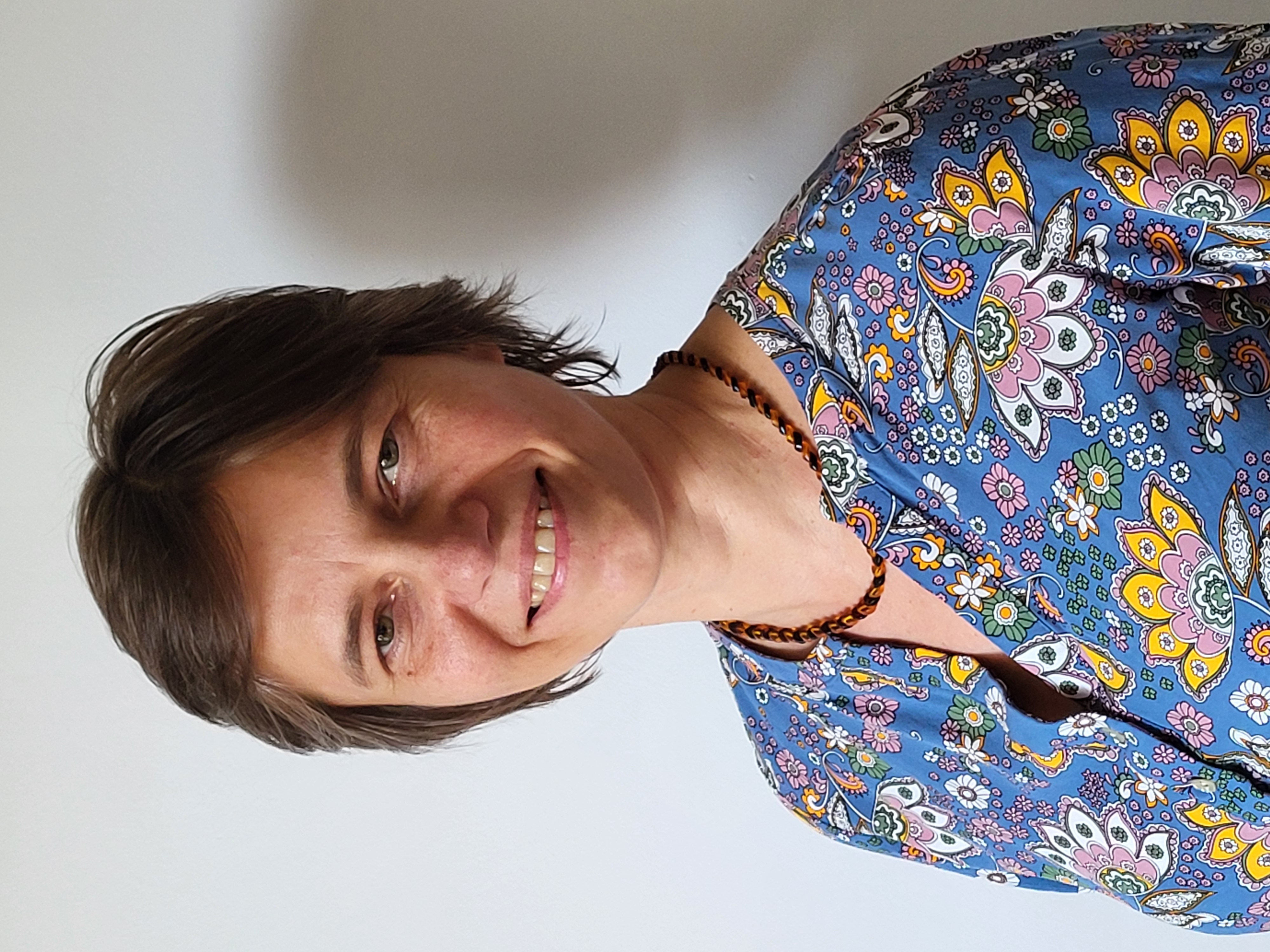
Wrocław Medical University, Poland
Dr. Agata Strządała is an assistant professor at the Department of Medical Humanities and Social Sciences at Wroclaw Medical University (Poland). Her academic work spans bioethics, medical humanities, cultural studies, and higher education policy. She is particularly interested in the ethical dimensions of medical practice, research involving both human and non-human subjects, intercultural communication in healthcare, and the social responsibility of universities.
Responsive and Responsible University: A Case Study of AIUB explores how the American International University-Bangladesh (AIUB) engaged in the Responsive and Responsible University initiative of Magna Charta Observatory (MCO) project from 2023 to 2025. Set in Korail, Dhaka's largest informal settlement, the project aimed to connect higher education with social responsibility through targeted community engagement initiatives. The project adopted a participatory approach led by both students and faculty members. It addressed four key areas of the Korail slum: women's empowerment, adolescent health and hygiene, sustainable low-cost housing, and moral education for children. Each intervention was designed using inclusive, contextually appropriate methods. The initiatives were aligned with the Sustainable Development Goals (SDGs) and reflected the Living Values of the Magna Charta Observatory (MCO). Overall, this work reflects AIUB's commitment to redefining its role beyond academic institution and towards becoming a catalyst for ethical, inclusive, and sustainable social transformation.

American International University-Bangladesh
Professor Dr. Carmen Z. Lamagna is currently a member of the Board of Trustees of the American International University‑Bangladesh (AIUB), where she also served as the Vice Chancellor for over two decades. Under her visionary leadership, AIUB grew from just 70 students to a renowned institution with over 14,000 students across four faculties. Born in Manila, Philippines, she holds a BS in Chemical Engineering from Adamson University, along with Master's degrees from the Philippines and a Doctorate from California Coast University. Dr. Lamagna played a pivotal role in establishing AIUB as a center of academic excellence in Bangladesh and beyond. She has held prominent positions in international academic bodies, including Treasurer and Executive Committee Member of the International Association of University Presidents (IAUP), Administrative Board Member of the International Association of Universities (IAU), and the first female President of the Association of Universities of Asia and the Pacific (AUAP). Her accolades include the Presidential Award for Overseas Filipinos, TIAW's Top 100 Women in Education, and the 100 Most Influential Filipina Women in the World.
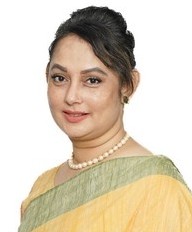
American International University-Bangladesh
Professor Farheen Hassan Ph.D., SFHEA; has a career which includes senior institutional management and international research, consultancy and teaching in the field of higher education from 1999. She is currently a consultant in Quality Assurance of HE and Director of Institutional Quality Assurance Cell-AIUB. Her previous positions have included Associate Dean of the Faculty of Business Administration, Director of Business School, Head of the Department of HRM, Additional director IQAC. Furthermore, she has served as a visiting lecturer at the University of Madras (2004-5), India and University of Gavle, Sweden (2012). Since 2011, she has been one of the leading QA professional, trainer, academic auditor, external peer reviewer and researcher with government, NGOs, international organizations, HE agencies e.g. British Council, IIEP-UNESCO, World Bank projects on HE, UGC, Bangladesh Accreditation Council, BAETEI, IEB, IAB, ISO, APQN, WURI, QS, THE, Magna Charta Observatory, Action Aid, UNICEF, UK-SoS and others in different capacities. Her efforts in the field of HE has been recognized with awards including, "Women of Inspiration in Academia" "Contribution of Women towards Peace" and "MTC Global Award of Excellence as Management Educator".
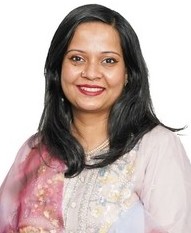
American International University-Bangladesh
Nazia Farhana is an Assistant Professor of Management Information Systems at AIUB and the Additional Director of its Institutional Quality Assurance Cell. With over a decade of teaching experience, she specializes in integrating technology into business education. She holds an MBA and a BSc in Computer Science and Engineering from the University of Dhaka. Her research focuses on the intersection of digitization and education, with particular emphasis on digital literacy, quality assurance in academic programs, technology-enhanced learning environments, and data-driven insights into student development. She has published widely in national and international journals and conferences, including APQN and ICCA. Nazia actively contributes to global academic projects such as ERASMUS+, Magna Charta Observatory and UK-SOS. She plays a central role in institutional accreditation, global rankings (QS, THE, WURI), and international partnerships. At AIUB, she leads initiatives that enhance student engagement and academic excellence. As a conference organizer and communications lead, she fosters collaboration and innovation across borders. She is deeply committed to advancing quality assurance and educational development.
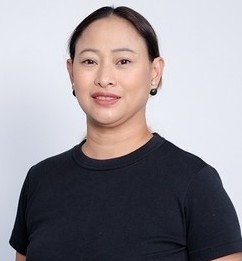
American International University-Bangladesh
Carlin Noelle Z. Lamagna is an accomplished academic and administrator with over two decades of experience in education and leadership. She currently serves as Chairman of DhakaPrep Learning Centre Ltd. and Assistant Professor at AIUB's Faculty of Arts and Social Sciences. Carlin holds an MBA from the University of Wollongong, Australia, and a Master's in Bilingual Education from Rangsit University, Thailand. Her undergraduate degree is in MIS from AIUB. She has a strong background in economics, instruction and educational technology. At AIUB, she is known for promoting student-centered, tech-integrated learning environments. Carlin has also served as a teaching assistant in Australia and as administrative staff at AIUB. She is deeply engaged in community-focused educational initiatives and believes in bridging academic learning with real-world impact. With a strong commitment to inclusive learning environments, she actively fosters student participation beyond the classroom through outreach, events, and collaborative projects. Technologically adept, she leverages digital tools to enhance engagement and innovation in education.
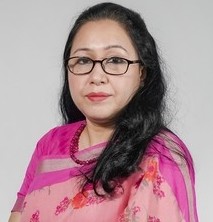
American International University-Bangladesh
Rezbin Nahar is an accomplished academic who currently serves as an Associate Professor in the Department of Management and Human Resource Management and the Director of the Undergraduate Program under the Faculty of Business Administration at American International University-Bangladesh (AIUB). She holds a PhD in Business Administration from the International Islamic University Malaysia (IIUM) and earned both her BBA and MBA from AIUB with Distinction and Academic Excellence Awards. With over 19 years of experience in higher education, Rezbin has previously served as an Assistant Professor and BBA Program Director at Southeast University. She has taught extensively at both undergraduate and graduate levels and also held teaching and research assistant roles at IIUM during her doctoral studies. Her research interests include Management, Human Resource Management, Operations Management, Management Information Systems, Organizational Behavior, and Business Education. Rezbin has authored and co-authored numerous articles in peer-reviewed journals and has presented them at prestigious international conferences. She is the editor of the IGI Global book Modern Talent Management in Knowledge Organizations: Post-Pandemic Paradigm and has contributed several chapters to internationally indexed publications. Her professional activities include contributing to newspapers, managing project-based initiatives, serving as an article editor and journal reviewer, and conducting corporate training on communication, leadership, and management. She also serves as an Expert Assessor in the evaluation process of leading private organizations in Bangladesh. Recognized for her academic leadership, Rezbin actively contributes to strategic planning, accreditation processes, curriculum development, and continuous quality enhancement in business education.
In an era marked by disruption, inequality, and accelerating global change, universities are increasingly being called upon to reimagine their roles, not only as centers of knowledge but as agents of societal transformation. The upcoming international event, "Responsibility and Impact: Global Perspectives from the MCO Research Initiative," provides a unique space for reflection, collaboration, and critical dialogue on the evolving responsibilities of higher education institutions.
This two-day forum, hosted by the American International University-Bangladesh (AIUB), brings together university leaders, scholars, and practitioners from across Europe and Asia to present their research and experiences under the umbrella of the Magna Charta Observatory's global initiative on The Responsive and Responsible University. Participating universities will share case studies, institutional strategies, and reflective analyses on how they are navigating questions of purpose, inclusion, impact, and ethical leadership within their own contexts.
This will also be the first time AIUB and Bangladesh hosts a Magna Charta Observatory event, marking a significant milestone in its continuing efforts to contribute to international academic cooperation and the global higher education community. Through its sessions, the forum will not only showcase thought-provoking research but also generate actionable insights and shared visions for building more accountable, inclusive, and forward-looking institutions.
Facilitate learning through presentation of diverse institutional approaches
Encourage meaningful dialogue on how universities can respond to contemporary societal needs
Build shared understanding of higher education's role in advancing equity, sustainability, and civic engagement
The Magna Charta Observatory (MCO) is a global organization dedicated to safeguarding and promoting the fundamental values that underpin higher education namely, academic freedom, institutional autonomy, and the societal responsibility of universities. Established in 1998 and based in Bologna, Italy, the MCO serves as the custodian of the Magna Charta Universitatum, a foundational declaration originally signed in 1988 by rectors of European universities to reaffirm these core principles in a rapidly changing world.
Over time, the MCO has evolved into an international platform for dialogue, research, and collaboration among universities committed to these ideals. With more than 900 signatory institutions from over 90 countries, the Observatory promotes not only the rights of universities to pursue teaching and research freely, but also their duty to engage with the broader challenges facing society. Through initiatives such as academic conferences, monitoring practices, and collaborative research, MCO provides guidance and advocacy to ensure that universities remain ethically grounded, socially responsive, and globally connected. The more about MCO can be found at www.magna-charta.org.
Protecting the right to teach, learn, and research freely
Ensuring university autonomy in academic and administrative matters
Promoting the highest standards in education and research
Launched in 2022 by the Magna Charta Observatory, the "Responsive and Responsible University" initiative is a pioneering research effort aimed at reshaping how higher education institutions understand and fulfill their role in society. Recognizing that universities today face growing demands for relevance, transparency, and accountability, the initiative shifts the focus from traditional academic performance to broader societal contribution.
The core objective is to explore how universities across diverse cultural and political contexts can become more responsive to pressing global issues—such as inequality, environmental sustainability, social justice, and technological disruption—while remaining committed to the values of academic freedom and integrity.
The project includes case-based research, institutional reflections, and interactive exchanges. It encourages cross-border learning and experimentation with new models of inclusion, governance, and engagement, generating practical insights that are transferable across regions and educational systems.
How can universities align their mission with public needs?
What practices foster ethical leadership and civic engagement?
How can higher education institutions be both autonomous and accountable?
Experimentation with new models of inclusion, governance, and engagement
The American International University-Bangladesh (AIUB) is a premier private university located in Dhaka, committed to delivering high-quality, globally relevant education in a student-centered environment. Since its establishment, AIUB has distinguished itself through a blend of academic excellence, innovation, and strong community engagement, offering undergraduate and graduate programs across engineering, business, arts, social sciences, and information technology.
AIUB actively integrates quality assurance practices, ethical values, and digital transformation across its teaching, research, and institutional governance. As a signatory of the Magna Charta Universitatum 2020, the university embraces the shared global mission of upholding academic freedom, promoting inclusion, and fostering sustainable development.
Beyond academics, AIUB contributes meaningfully to national progress through partnerships with government agencies, industry, and civil society organizations. From sustainability campaigns and health awareness drives to digital literacy and gender equity initiatives, AIUB demonstrates its role as a responsible institution committed to creating a better future.
By hosting the first-ever MCO event in Bangladesh, AIUB reinforces its leadership in the global higher education landscape and its ongoing pursuit of innovation, ethics, and impact in all dimensions of academic life.
Years of Excellence
Students
Faculty Members
Programs
Internationally recognized degree programs
State-of-the-art research facilities
Contemporary facilities and technology
Explore our modern campus facilities and vibrant academic environment

Modern AIUB campus from a breathtaking aerial perspective
The conference will be held at American International University-Bangladesh, located in the heart of Dhaka. The venue offers modern conference facilities and easy accessibility from major transportation hubs.
408/1 (Old KA 66/1), Kuratoli, Khilkhet, Dhaka 1229, Bangladesh
Hazrat Shahjalal International Airport - 30 minutes by taxi
Complimentary parking available on campus
Accessible by bus and rickshaw from major city areas
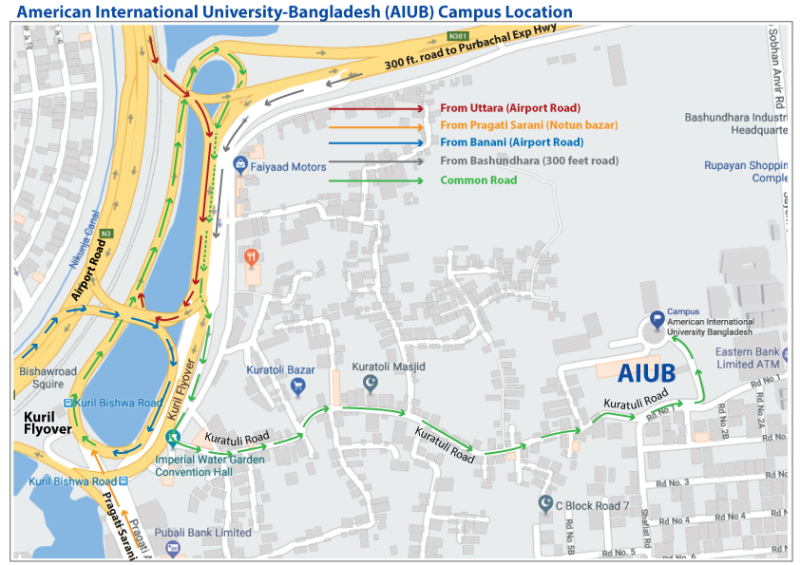

AIUB Campus
Dr. Carmen Z. Lamagna, Member, AIUB Board of Trustees
Dr. David J. Lock, Secretary General, Magna Charta Observatory
Coffee and networking
Dr. Mary Deasy & Dr. Catherine Bates
Technological University, Dublin (TU Dublin), Ireland
Dr. Nomeda Gudelienė and Prof. Dangis Gudelis
Mykolas Romeris University, Lithuania
The Responsible University: Cross-Cutting themes from all the Projects Hosting
Emeritus Professor John L. Davies, MCO Ambassador and Editor of the Research Publication
Coffee and networking
Dr. Agata Strządała
Wroclaw Medical University, Poland
Dr. Carmen Z. Lamagna, Dr. Farheen Hassan, Ms. Nazia Farhana, Ms. Carlin Z. Lamagna & Dr. Rezbin Nahar
American International University-Bangladesh, Bangladesh
A colloquium of student-led SDG initiatives presented by AIUB’s aspiring changemakers
Reflections & Roadmap: Shaping MCO's Next Steps
By Ms. Nadia Anwar, Chairman, Board of Trustees, AIUB
By Prof. Dr. Saiful Islam, Vice-Chancellor, AIUB
Featuring traditional performances
September 20, 2025
Faculty, Researchers, Students, Policymakers
Free of Charge
Open to faculty, researchers, students, and policymakers. RSVP Required for participation in this event.
aiub-iqac@aiub.edu
farhana_nazia@aiub.edu
+8801675535487
+8801670974052
American International University-Bangladesh
408/1 (Old KA 66/1), Kuratoli, Khilkhet, Dhaka 1229, Bangladesh